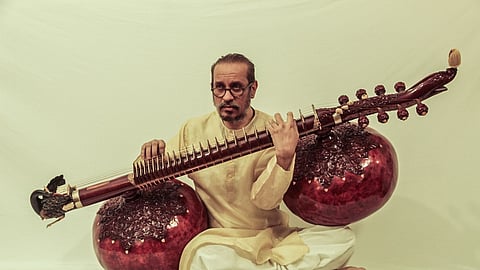

Instrument — few who wield it can evoke its true beauty in the most charming way. But Ustad Bahauddin Dagar, a 20th-generation maestro, does so with poise and meticulous command. In 2012, he was honoured with Sangeet Natak Akademi Award, the highest award for performing artists. After performing at an event in the city, he speaks with CE about his rich musical lineage and shares his perspectives on music and life.
“I am the first one in my family to learn the Rudra Veena. This is rather unfortunate; it would have been nice if another family member also played it…imagine the deep conversations we would have had,” laments Ustad Bahauddin. For the uninitiated, the Rudra Veena is a stringed instrument associated with the Dhrupad genre of Hindustani Classical music. It is known for its deep bass resonance and capability to measure notes. “It brings subtlety. You can suggest something without even playing a note sometimes. Or you can make the most minimal movement, which can create a huge impact,” he says.
The maestro gives us a unique metaphor: “It is like an elephant, whose foot can crush anything in its path. But at the same time, if this animal walks on dry leaves, he doesn’t make a sound.”
Unlike the stereotypical maestro who may channel too much gravitas, Ustad Bahauddin keeps his humour intact, quipping, “So, you must play the Rudra Veena carefully — playing it very fast is like a paagal hathi charging at you!”
In conversation, the maestro is calm and practical, possessing an intense form of worldly wisdom. He traces his lineage back to a musician ancestor with the Pandey surname in the 13th century. “The advantage of having such a lineage is that there is already a vast body of work. Unfortunately, we lost the family history records during Partition, and can now only trace 10 generations. But my ancestors have been in the courts of great Rajput kings and even Bahadur Shah Zafar (the last Mughal emperor).”
Growing up, the little Bahauddin saw his mother teach sitar every day and his uncle indulge in jazz. “Once, American jazz musician Don Cherry came home as well. It was my uncle who exposed me to new genres; in no time, I was listening to Boney M, Madonna, hard rock, and metal. I even had a keen interest in painting and considered pursuing Fine Arts. But at 16, something changed,” he reveals. What was that turning point? The maestro recalls, “Well, I played the tanpura behind my father at The Festival of India tour in 1986. Suddenly, my eyes and ears opened to the nuances of music…it was marvellous. I saw a timelessness in it.” Thereafter, he devoted his days to music.
But he started learning the Rudra Veena, which is second nature to him today, after his father passed away in 1990. “This instrument requires undivided attention. Family and friends become secondary. And I do not regret my decision at all,” he states.
In a line of work that requires, by and large, hours of riyaaz (practice), steely focus, and perfection, Ustad Bahauddin confesses that he makes mistakes — and is not embarrassed. “So what? It is not an examination. Making a mistake is when I am doing something new!”
And embodying the ‘new’ is what this maestro solemnly stands by. “When I was younger, people would chide me, saying I wasn’t as good as my father. I wasn’t hurt, no; rather, the fire in my belly prodded me to be better and new. If I am just like my father, what will be special about me?” he asks.
Ustad Bahauddin leaves us with another metaphor that perhaps holds good not just for musicians, but also for journalists, politicians, businesspersons, engineers, and the like: “You are a tree. The roots will stay firm beneath you in the soil, but every once in a while, you will grow new branches, leaves, and flowers. Just find the balance in all of these…”